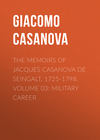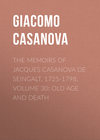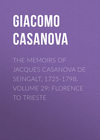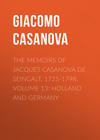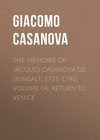Kitabı oku: «The Memoirs of Jacques Casanova de Seingalt, 1725-1798. Volume 03: Military Career»
CHAPTER XIII
I Renounce the Clerical Profession, and Enter the Military Service—Therese Leaves for Naples, and I Go to Venice—I Am Appointed Ensign in the Army of My Native Country—I Embark for Corfu, and Land at Orsera to Take a Walk
I had been careful, on my arrival in Bologna, to take up my quarters at a small inn, so as not to attract any notice, and as soon as I had dispatched my letters to Therese and the French officer, I thought of purchasing some linen, as it was at least doubtful whether I should ever get my trunk. I deemed it expedient to order some clothes likewise. I was thus ruminating, when it suddenly struck me that I was not likely now to succeed in the Church, but feeling great uncertainty as to the profession I ought to adopt, I took a fancy to transform myself into an officer, as it was evident that I had not to account to anyone for my actions. It was a very natural fancy at my age, for I had just passed through two armies in which I had seen no respect paid to any garb but to the military uniform, and I did not see why I should not cause myself to be respected likewise. Besides, I was thinking of returning to Venice, and felt great delight at the idea of shewing myself there in the garb of honour, for I had been rather ill-treated in that of religion.
I enquired for a good tailor: death was brought to me, for the tailor sent to me was named Morte. I explained to him how I wanted my uniform made, I chose the cloth, he took my measure, and the next day I was transformed into a follower of Mars. I procured a long sword, and with my fine cane in hand, with a well-brushed hat ornamented with a black cockade, and wearing a long false pigtail, I sallied forth and walked all over the city.
I bethought myself that the importance of my new calling required a better and more showy lodging than the one I had secured on my arrival, and I moved to the best inn. I like even now to recollect the pleasing impression I felt when I was able to admire myself full length in a large mirror. I was highly pleased with my own person! I thought myself made by nature to wear and to honour the military costume, which I had adopted through the most fortunate impulse. Certain that nobody knew me, I enjoyed by anticipation all the conjectures which people would indulge in respecting me, when I made my first appearance in the most fashionable cafe of the town.
My uniform was white, the vest blue, a gold and silver shoulder-knot, and a sword-knot of the same material. Very well pleased with my grand appearance, I went to the coffee-room, and, taking some chocolate, began to read the newspapers, quite at my ease, and delighted to see that everybody was puzzled. A bold individual, in the hope of getting me into conversation, came to me and addressed me; I answered him with a monosyllable, and I observed that everyone was at a loss what to make of me. When I had sufficiently enjoyed public admiration in the coffee-room, I promenaded in the busiest thoroughfares of the city, and returned to the inn, where I had dinner by myself.
I had just concluded my repast when my landlord presented himself with the travellers' book, in which he wanted to register my name.
"Casanova."
"Your profession, if you please, sir?"
"Officer."
"In which service?"
"None."
"Your native place?"
"Venice."
"Where do you come from?"
"That is no business of yours."
This answer, which I thought was in keeping with my external appearance, had the desired effect: the landlord bowed himself out, and I felt highly pleased with myself, for I knew that I should enjoy perfect freedom in Bologna, and I was certain that mine host had visited me at the instance of some curious person eager to know who I was.
The next day I called on M. Orsi, the banker, to cash my bill of exchange, and took another for six hundred sequins on Venice, and one hundred sequins in gold after which I again exhibited myself in the public places. Two days afterwards, whilst I was taking my coffee after dinner, the banker Orsi was announced. I desired him to be shewn in, and he made his appearance accompanied my Monsignor Cornaro, whom I feigned not to know. M. Orsi remarked that he had called to offer me his services for my letters of exchange, and introduced the prelate. I rose and expressed my gratification at making his acquaintance. "But we have met before," he replied, "at Venice and Rome." Assuming an air of blank surprise, I told him he must certainly be mistaken. The prelate, thinking he could guess the reason of my reserve, did not insist, and apologized. I offered him a cup of coffee, which he accepted, and, on leaving me, he begged the honour of my company to breakfast the next day.
I made up my mind to persist in my denials, and called upon the prelate, who gave me a polite welcome. He was then apostolic prothonotary in Bologna. Breakfast was served, and as we were sipping our chocolate, he told me that I had most likely some good reasons to warrant my reserve, but that I was wrong not to trust him, the more so that the affair in question did me great honour. "I do not know," said I, "what affair you are alluding to." He then handed me a newspaper, telling me to read a paragraph which he pointed out. My astonishment may be imagined when I read the following correspondence from Pesaro: "M. de Casanova, an officer in the service of the queen, has deserted after having killed his captain in a duel; the circumstances of the duel are not known; all that has been ascertained is that M. de Casanova has taken the road to Rimini, riding the horse belonging to the captain, who was killed on the spot."
In spite of my surprise, and of the difficulty I had in keeping my gravity at the reading of the paragraph, in which so much untruth was blended with so little that was real, I managed to keep a serious countenance, and I told the prelate that the Casanova spoken of in the newspaper must be another man.
"That may be, but you are certainly the Casanova I knew a month ago atCardinal Acquaviva's, and two years ago at the house of my sister, MadameLovedan, in Venice. Besides the Ancona banker speaks of you as anecclesiastic in his letter of advice to M. Orsi:"
"Very well, monsignor; your excellency compels me to agree to my being the same Casanova, but I entreat you not to ask me any more questions as I am bound in honour to observe the strictest reserve."
"That is enough for me, and I am satisfied. Let us talk of something else."
I was amused at the false reports which were being circulated about me, and, I became from that moment a thorough sceptic on the subject of historical truth. I enjoyed, however, very great pleasure in thinking that my reserve had fed the belief of my being the Casanova mentioned in the newspaper. I felt certain that the prelate would write the whole affair to Venice, where it would do me great honour, at least until the truth should be known, and in that case my reserve would be justified, besides, I should then most likely be far away. I made up my mind to go to Venice as soon as I heard from Therese, as I thought that I could wait for her there more comfortably than in Bologna, and in my native place there was nothing to hinder me from marrying her openly. In the mean time the fable from Pesaro amused me a good deal, and I expected every day to see it denied in some newspaper. The real officer Casanova must have laughed at the accusation brought against him of having run away with the horse, as much as I laughed at the caprice which had metamorphosed me into an officer in Bologna, just as if I had done it for the very purpose of giving to the affair every appearance of truth.
On the fourth day of my stay in Bologna, I received by express a long letter from Therese. She informed me that, on the day after my escape from Rimini, Baron Vais had presented to her the Duke de Castropignano, who, having heard her sing, had offered her one thousand ounces a year, and all travelling expenses paid, if she would accept an engagement as prima-donna at the San Carlo Theatre, at Naples, where she would have to go immediately after her Rimini engagement. She had requested and obtained a week to come to a decision. She enclosed two documents, the first was the written memorandum of the duke's proposals, which she sent in order that I should peruse it, as she did not wish to sign it without my consent; the second was a formal engagement, written by herself, to remain all her life devoted to me and at my service. She added in her letter that, if I wished to accompany her to Naples, she would meet me anywhere I might appoint, but that, if I had any objection to return to that city, she would immediately refuse the brilliant offer, for her only happiness was to please me in all things.
For the first time in my life I found myself in need of thoughtful consideration before I could make up my mind. Therese's letter had entirely upset all my ideas, and, feeling that I could not answer it a once, I told the messenger to call the next day.
Two motives of equal weight kept the balance wavering; self-love and love for Therese. I felt that I ought not to require Therese to give up such prospects of fortune; but I could not take upon myself either to let her go to Naples without me, or to accompany her there. On one side, I shuddered at the idea that my love might ruin Therese's prospects; on the other side, the idea of the blow inflicted on my self-love, on my pride, if I went to Naples with her, sickened me.
How could I make up my mind to reappear in that city, in the guise of a cowardly fellow living at the expense of his mistress or his wife? What would my cousin Antonio, Don Polo and his dear son, Don Lelio Caraffa, and all the patricians who knew me, have said? The thought of Lucrezia and of her husband sent a cold shiver through me. I considered that, in spite of my love for Therese, I should become very miserable if everyone despised me. Linked to her destiny as a lover or as a husband, I would be a degraded, humbled, and mean sycophant. Then came the thought, Is this to be the end of all my hopes? The die was cast, my head had conquered my heart. I fancied that I had hit upon an excellent expedient, which at all events made me gain time, and I resolved to act upon it. I wrote to Therese, advising her to accept the engagement for Naples, where she might expect me to join her in the month of July, or after my return from Constantinople. I cautioned her to engage an honest-looking waiting-woman, so as to appear respectably in the world, and, to lead such a life as would permit me to make her my wife, on my return, without being ashamed of myself. I foresaw that her success would be insured by her beauty even more than by her talent, and, with my nature, I knew that I could never assume the character of an easy-going lover or of a compliant husband.
Had I received Therese's letter one week sooner, it is certain that she would not have gone to Naples, for my love would then have proved stronger than my reason; but in matters of love, as well as in all others, Time is a great teacher.
I told Therese to direct her answer to Bologna, and, three days after, I received from her a letter loving, and at the same time sad, in which she informed me that she had signed the engagement. She had secured the services of a woman whom she could present as her mother; she would reach Naples towards the middle of May, and she would wait for me there till she heard from me that I no longer wanted her.
Four days after the receipt of that letter, the last but one that Therese wrote me, I left Bologna for Venice. Before my departure I had received an answer form the French officer, advising me that my passport had reached Pesaro, and that he was ready to forward it to me with my trunk, if I would pay M. Marcello Birna, the proveditore of the Spanish army, whose address he enclosed, the sum of fifty doubloons for the horse which I had run away with, or which had run away with me. I repaired at once to the house of the proveditore, well pleased to settle that affair, and I received my trunk and my passport a few hours before leaving Bologna. But as my paying for the horse was known all over the town, Monsignor Cornaro was confirmed in his belief that I had killed my captain in a duel.
To go to Venice, it was necessary to submit to a quarantine, which had been adhered to only because the two governments had fallen out. The Venetians wanted the Pope to be the first in giving free passage through his frontiers, and the Pope insisted that the Venetians should take the initiative. The result of this trifling pique between the two governments was great hindrance to commerce, but very often that which bears only upon the private interest of the people is lightly treated by the rulers. I did not wish to be quarantined, and determined on evading it. It was rather a delicate undertaking, for in Venice the sanitary laws are very strict, but in those days I delighted in doing, if not everything that was forbidden, at least everything which offered real difficulties.
I knew that between the state of Mantua and that of Venice the passage was free, and I knew likewise that there was no restriction in the communication between Mantua and Modena; if I could therefore penetrate into the state of Mantua by stating that I was coming from Modena, my success would be certain, because I could then cross the Po and go straight to Venice. I got a carrier to drive me to Revero, a city situated on the river Po, and belonging to the state of Mantua.
The driver told me that, if he took the crossroads, he could go to Revero, and say that we came from Mantua, and that the only difficulty would be in the absence of the sanitary certificate which is delivered in Mantua, and which was certain to be asked for in Revero. I suggested that the best way to manage would be for him to say that he had lost it, and a little money removed every objection on his part.
When we reached the gates of Revero, I represented myself as a Spanish officer going to Venice to meet the Duke of Modena (whom I knew to be there) on business of the greatest importance. The sanitary certificate was not even demanded, military honours were duly paid to me, and I was most civilly treated. A certificate was immediately delivered to me, setting forth that I was travelling from Revero, and with it I crossed the Po, without any difficulty, at Ostiglia, from which place I proceeded to Legnago. There I left my carrier as much pleased with my generosity as with the good luck which had attended our journey, and, taking post-horses, I reached Venice in the evening. I remarked that it was the and of April, 1744, the anniversary of my birth, which, ten times during my life, has been marked by some important event.
The very next morning I went to the exchange in order to procure a passage to Constantinople, but I could not find any passenger ship sailing before two or three months, and I engaged a berth in a Venetian ship called, Our Lady of the Rosary, Commander Zane, which was to sail for Corfu in the course of the month.
Having thus prepared myself to obey my destiny, which, according to my superstitious feelings, called me imperiously to Constantinople, I went to St: Mark's Square in order to see and to be seen, enjoying by anticipation the surprise of my acquaintances at not finding me any longer an abbe. I must not forget to state that at Revero I had decorated my hat with a red cockade.
I thought that my first visit was, by right, due to the Abbe Grimani. The moment he saw me he raised a perfect shriek of astonishment, for he thought I was still with Cardinal Acquaviva, on the road to a political career, and he saw standing before him a son of Mars. He had just left the dinner-table as I entered, and he had company. I observed amongst the guests an officer wearing the Spanish uniform, but I was not put out of countenance. I told the Abbe Grimani that I was only passing through Venice, and that I had felt it a duty and a pleasure to pay my respects to him.
"I did not expect to see you in such a costume."
"I have resolved to throw off the garb which could not procure me a fortune likely to satisfy my ambition."
"Where are you going?"
"To Constantinople; and I hope to find a quick passage to Corfu, as I have dispatches from Cardinal Acquaviva."
"Where do you come from now?"
"From the Spanish army, which I left ten days ago."
These words were hardly spoken, when I heard the voice of a young nobleman exclaiming;
"That is not true."
"The profession to which I belong," I said to him with great animation, "does not permit me to let anyone give me the lie."
And upon that, bowing all round, I went away, without taking any notice of those who were calling me back.
I wore an uniform; it seemed to me that I was right in showing that sensitive and haughty pride which forms one of the characteristics of military men. I was no longer a priest: I could not bear being given the lie, especially when it had been given to me in so public a manner.
I called upon Madame Manzoni, whom I was longing to see. She was very happy to see me, and did not fail to remind me of her prediction. I told her my history, which amused her much; but she said that if I went to Constantinople I should most likely never see her again.
After my visit to Madame Manzoni I went to the house of Madame Orio, where I found worthy M. Rosa, Nanette, and Marton. They were all greatly surprised, indeed petrified at seeing me. The two lovely sisters looked more beautiful than ever, but I did not think it necessary to tell them the history of my nine months absence, for it would not have edified the aunt or pleased the nieces. I satisfied myself with telling them as much as I thought fit, and amused them for three hours. Seeing that the good old lady was carried away by her enthusiasm, I told her that I should be very happy to pass under her roof the four or five weeks of my stay in Venice, if she could give me a room and supper, but on condition that I should not prove a burden to her or to her charming nieces.
"I should be only too happy," she answered, "to have you so long, but I have no room to offer you."
"Yes, you have one, my dear," exclaimed M. Rosa, "and I undertake to put it to rights within two hours."
It was the room adjoining the chamber of the two sisters. Nanette said immediately that she would come downstairs with her sister, but Madame Orio answered that it was unnecessary, as they could lock themselves in their room.
"There would be no need for them to do that, madam," I said, with a serious and modest air; "and if I am likely to occasion the slightest disturbance, I can remain at the inn."
"There will be no disturbance whatever; but forgive my nieces, they are young prudes, and have a very high opinion of themselves:"
Everything being satisfactorily arranged, I forced upon Madame Orio a payment of fifteen sequins in advance, assuring her that I was rich, and that I had made a very good bargain, as I should spend a great deal more if I kept my room at the inn. I added that I would send my luggage, and take up my quarters in her house on the following day. During the whole of the conversation, I could see the eyes of my two dear little wives sparkling with pleasure, and they reconquered all their influence over my heart in spite of my love for Therese, whose image was, all the same, brilliant in my soul: this was a passing infidelity, but not inconstancy.
On the following day I called at the war office, but, to avoid every chance of unpleasantness, I took care to remove my cockade. I found in the office Major Pelodoro, who could not control his joy when he saw me in a military uniform, and hugged me with delight. As soon as I had explained to him that I wanted to go to Constantinople, and that, although in uniform, I was free, he advised me earnestly to seek the favour of going to Turkey with the bailo, who intended to leave within two months, and even to try to obtain service in the Venetian army.
His advice suited me exactly, and the secretary of war, who had known me the year before, happening to see me, summoned me to him. He told me that he had received letters from Bologna which had informed him of a certain adventure entirely to my honour, adding that he knew that I would not acknowledge it. He then asked me if I had received my discharge before leaving the Spanish army.
"I could not receive my discharge, as I was never in the service."
"And how did you manage to come to Venice without performing quarantine?"
"Persons coming from Mantua are not subject to it."
"True; but I advise you to enter the Venetian service like MajorPelodoro."
As I was leaving the ducal palace, I met the Abbe Grimani who told me that the abrupt manner in which I had left his house had displeased everybody.
"Even the Spanish officer?"
"No, for he remarked that, if you had truly been with the army, you could not act differently, and he has himself assured me that you were there, and to prove what he asserted he made me read an article in the newspaper, in which it is stated that you killed your captain in a duel. Of course it is only a fable?"
"How do you know that it is not a fact?"
"Is it true, then?"
"I do not say so, but it may be true, quite as true as my having been with the Spanish army ten days ago."
"But that is impossible, unless you have broken through the quarantine."
"I have broken nothing. I have openly crossed the Po at Revero, and here I am. I am sorry not to be able to present myself at your excellency's palace, but I cannot do so until I have received the most complete satisfaction from the person who has given me the lie. I could put up with an insult when I wore the livery of humility, but I cannot bear one now that I wear the garb of honour."
"You are wrong to take it in such a high tone. The person who attacked your veracity is M. Valmarana, the proveditore of the sanitary department, and he contends that, as nobody can pass through the cordon, it would be impossible for you to be here. Satisfaction, indeed! Have you forgotten who you are?"
"No, I know who I am; and I know likewise that, if I was taken for a coward before leaving Venice, now that I have returned no one shall insult me without repenting it."
"Come and dine with me."
"No, because the Spanish officer would know it."
"He would even see you, for he dines with me every day."
"Very well, then I will go, and I will let him be the judge of my quarrel with M. Valmarana."
I dined that day with Major Pelodoro and several other officers, who agreed in advising me to enter the service of the Republic, and I resolved to do so. "I am acquainted," said the major, "with a young lieutenant whose health is not sufficiently strong to allow him to go to the East, and who would be glad to sell his commission, for which he wants one hundred sequins. But it would be necessary to obtain the consent of the secretary of war." "Mention the matter to him," I replied, "the one hundred sequins are ready." The major undertook the commission.
In the evening I went to Madame Orio, and I found myself very comfortably lodged. After supper, the aunt told her nieces to shew me, to my room, and, as may well be supposed, we spent a most delightful night. After that they took the agreeable duty by turns, and in order to avoid any surprise in case the aunt should take it into her head to pay them a visit, we skilfully displaced a part of the partition, which allowed them to come in and out of my room without opening the door. But the good lady believed us three living specimens of virtue, and never thought of putting us to the test.
Two or three days afterwards, M. Grimani contrived an interview between me and M. Valmarana, who told me that, if he had been aware that the sanitary line could be eluded, he would never have impugned my veracity, and thanked me for the information I had given him. The affair was thus agreeably arranged, and until my departure I honoured M. Grimani's excellent dinner with my presence every day.
Towards the end of the month I entered the service of the Republic in the capacity of ensign in the Bala regiment, then at Corfu; the young man who had left the regiment through the magical virtue of my one hundred sequins was lieutenant, but the secretary of war objected to my having that rank for reasons to which I had to submit, if I wished to enter the army; but he promised me that, at the end of the year, I would be promoted to the grade of lieutenant, and he granted me a furlough to go to Constantinople. I accepted, for I was determined to serve in the army.
M. Pierre Vendramin, an illustrious senator, obtained me the favour of a passage to Constantinople with the Chevalier Venier, who was proceeding to that city in the quality of bailo, but as he would arrive in Corfu a month after me, the chevalier very kindly promised to take me as he called at Corfu.
A few days before my departure, I received a letter from Therese, who informed me that the Duke de Castropignano escorted her everywhere. "The duke is old," she wrote, "but even if he were young, you would have no cause for uneasiness on my account. Should you ever want any money, draw upon me from any place where you may happen to be, and be quite certain that your letters of exchange will be paid, even if I had to sell everything I possess to honour your signature."
There was to be another passenger on board the ship of the line on which I had engaged my passage, namely, a noble Venetian, who was going to Zante in the quality of counsellor, with a numerous and brilliant retinue. The captain of the ship told me that, if I was obliged to take my meals alone, I was not likely to fare very well, and he advised me to obtain an introduction to the nobleman, who would not fail to invite me to share his table. His name was Antonio Dolfin, and he had been nicknamed Bucentoro, in consequence of his air of grandeur and the elegance of his toilet. Fortunately I did not require to beg an introduction, for M. Grimani offered, of his own accord, to present me to the magnificent councillor, who received me in the kindest manner, and invited me at once to take my meals at his table. He expressed a desire that I should make the acquaintance of his wife, who was to accompany him in the journey. I called upon her the next day, and I found a lady perfect in manners, but already of a certain age and completely deaf. I had therefore but little pleasure to expect from her conversation. She had a very charming young daughter whom she left in a convent. She became celebrated afterwards, and she is still alive, I believe, the widow of Procurator Iron, whose family is extinct.
I have seldom seen a finer-looking man, or a man of more imposing appearance than M. Dolfin. He was eminently distinguished for his wit and politeness. He was eloquent, always cheerful when he lost at cards, the favourite of ladies, whom he endeavoured to please in everything, always courageous, and of an equal temper, whether in good or in adverse fortune.
He had ventured on travelling without permission, and had entered a foreign service, which had brought him into disgrace with the government, for a noble son of Venice cannot be guilty of a greater crime. For this offence he had been imprisoned in the Leads—a favour which destiny kept also in reserve for me.
Highly gifted, generous, but not wealthy, M. Dolfin had been compelled to solicit from the Grand Council a lucrative governorship, and had been appointed to Zante; but he started with such a splendid suite that he was not likely to save much out of his salary. Such a man as I have just portrayed could not make a fortune in Venice, because an aristocratic government can not obtain a state of lasting, steady peace at home unless equality is maintained amongst the nobility, and equality, either moral or physical, cannot be appreciated in any other way than by appearances. The result is that the man who does not want to lay himself open to persecution, and who happens to be superior or inferior to the others, must endeavour to conceal it by all possible means. If he is ambitious, he must feign great contempt for dignities; if he seeks employment, he must not appear to want any; if his features are handsome, he must be careless of his physical appearance; he must dress badly, wear nothing in good taste, ridicule every foreign importation, make his bow without grace, be careless in his manner; care nothing for the fine arts, conceal his good breeding, have no foreign cook, wear an uncombed wig, and look rather dirty. M. Dolfin was not endowed with any of those eminent qualities, and therefore he had no hope of a great fortune in his native country.
The day before my departure from Venice I did not go out; I devoted the whole of the day to friendship. Madame Orio and her lovely nieces shed many tears, and I joined them in that delightful employment. During the last night that I spent with both of them, the sisters repeated over and over, in the midst of the raptures of love, that they never would see me again. They guessed rightly; but if they had happened to see me again they would have guessed wrongly. Observe how wonderful prophets are!
I went on board, on the 5th of May, with a good supply of clothing, jewels, and ready cash. Our ship carried twenty-four guns and two hundred Sclavonian soldiers. We sailed from Malamacca to the shores of Istria during the night, and we came to anchor in the harbour of Orsera to take ballast. I landed with several others to take a stroll through the wretched place where I had spent three days nine months before, a recollection which caused me a pleasant sensation when I compared my present position to what it was at that time. What a difference in everything—health, social condition, and money! I felt quite certain that in the splendid uniform I was now wearing nobody would recognize the miserable-looking abbe who, but for Friar Stephano, would have become—God knows what!
